Patsy Trench's Blog, page 9
April 26, 2016
Self publishing: the nuts and bolts
In response to some queries I’ve been receiving recently from writers thinking about self publishing, here is an update on the nuts and bolts of what it entails.
Self publishing offers exciting opportunities for writers …
You get to be in control of everything, including
When you publish
What you publish
The look of the book, including cover design
The price
… It also entails a certain amount of hard work, but depending on your inclination and your budget you can get other people to do all or some of it for you. Here’s what you need to do:
Write the best book you can and have it professionally edited and proofread
Hire a professional cover designer
Convert the manuscript into ebook for Amazon and other online retailers
Publish the ebook on Amazon direct, and/or through Smashwords
Design and publish the paperback
Market it!
Amazon is the leading online retailer but there are other important outlets as well, including Kobo, Nook and Apple iBooks. It is possible to publish your book on all of them for free.
There is also Ingram Spark. They publish and distribute ebooks and paperbacks globally. The pros and cons of IS are
Their worldwide distribution is better than Amazon’s
The quality of paper and print is marginally better than Amazon’s
You have a better chance of selling your book through retailers who don’t like Amazon
They have print outlets in the UK and in Australia, as well as the USA
Unlike Amazon and the rest however you will need your own ISBN. These are available to buy in a minimum of 10 through Neilsen (in the UK).
Marketing your book is a challenge, there’s no doubt about that, and the more writers choose to self publish the harder it is to get anyone to read your book. In my experience non fiction is easier to market than fiction as you can target a specific audience. That said, you can do as little or as much marketing as you like depending on whether you are hoping to make money out of your writing or are just happy to have your book out there.
For more information on the whole process, plus how to find people to help you, please click on https://patsytrench.com/2015/08/16/self-publishing-for-family-historians/
If you are serious about self publishing you might consider joining The Alliance of Independent Authors. They have a private Facebook forum where you can get advice on all aspects of independent publishing, and there are also regular online conferences and physical meetups. Click on the ALLi sidebar on this page to find out more.
Good luck with your indie publishing enterprise, and if you have any questions don’t hesitate to get in touch.
Patsy Trench
patsytrench@gmail.com


March 1, 2016
When your characters run away from you
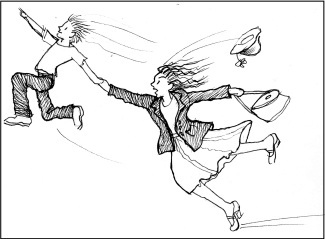
(sketch by Anna de Polnay)
This is annoying for a dyed-in-the-wool planner. As an example in my current oeuvre my central character – a woman in her forties whose husband, who was a spy in WW1, died under mysterious circumstances – has just decided that rather than accepting an invitation to visit Lady Ottoline Morrell in her mansion in Garsington (both of which I have researched industriously) she is going to embark on a quest to find out exactly how her husband died.
This not only alters the trajectory of my book, it threatens to turn what was meant to be a cheerful memoir of a free-thinking woman of the 1920s into a spy thriller. Now I have to down tools and make trips to the Imperial War Museum and read up on what spies did in WW1, mindful of the fact that everything to do with the secret service in the war was by definition secret, which means the answer isn’t going to come easily, if at all. (Though one joyful discovery: it turns out they – both spies and spy-masters – really were known by letters rather than names, as in ‘C’ and ‘R’ and so on.)

Imperial War Museum
How does any writer plan a book so he or she knows what’s going to happen in the end? I guess if you’re writing thrillers, or anything where plot is paramount, it’s easier to manipulate your characters to fit the story; though they are still people, with wills and desires and temperaments and a natural human instinct for disobedience. Or if they’re not they probably won’t be that interesting.
This really all came about as a result of NaNoWriMo (for those not in the know, this is an annual scheme to encourage writers to try to write the best part of a novel in one month, November). When you have to get your 2000 words a day down and you simply don’t have time to go back on things or to change your mind, let alone to research something, you find yourself making decisions on the spot that may come back to haunt you later. Hence the fact that my character married a spy. (Where did that come from?)
Writing books with recalcitrant people in them certainly keeps you on your toes, and it teaches you something else. I know a lot more about WW1 than I ever did, and even a fair bit about spying. Maybe my next book will be a spy novel.

Did you know Somerset Maugham was a spy in WW1? (photo in Imperial War Museum)
Controlling your characters

Trying to control your characters is like trying to control your children (sketch by Anna de Polnay)
This is annoying for a dyed-in-the-wool planner. As an example in my current oeuvre my central character – a woman in her forties whose husband, who was a spy in WW1, died under mysterious circumstances – has just decided that rather than accepting an invitation to visit Lady Ottoline Morrell in her mansion in Garsington (both of which I have researched industriously) she is going to embark on a quest to find out exactly how her husband died.
This not only alters the trajectory of my book, it threatens to turn what was meant to be a cheerful memoir of a free-thinking woman of the 1920s into a spy thriller. Now I have to down tools and make trips to the Imperial War Museum and read up on what spies did in WW1, mindful of the fact that everything to do with the secret service in the war was by definition secret, which means the answer isn’t going to come easily, if at all. (Though one joyful discovery: it turns out they – both spies and spy-masters – really were known by letters rather than names, as in ‘C’ and ‘R’ and so on.)

Imperial War Museum
How does any writer plan a book so he or she knows what’s going to happen in the end? I guess if you’re writing thrillers, or anything where plot is paramount, it’s easier to manipulate your characters to fit the story; though they are still people, with wills and desires and temperaments and a natural human instinct for disobedience. Or if they’re not they probably won’t be that interesting.
This really all came about as a result of NaNoWriMo (for those not in the know, this is an annual scheme to encourage writers to try to write the best part of a novel in one month, November). When you have to get your 2000 words a day down and you simply don’t have time to go back on things or to change your mind, let alone to research something, you find yourself making decisions on the spot that may come back to haunt you later. Hence the fact that my character married a spy. (Where did that come from?)
Writing books with recalcitrant people in them certainly keeps you on your toes, and it teaches you something else. I know a lot more about WW1 than I ever did, and even a fair bit about spying. Maybe my next book will be a spy novel.

Did you know Somerset Maugham was a spy in WW1? (photo in Imperial War Museum)
February 4, 2016
Ingram Spark (& others)

When I first published The World Country in the World back in 2012 the only option for indie publishers was Amazon. Ingram, a family firm (then and now), existed as book distributors only, and their print arm Lightning Source was aimed largely at traditional publishers.
All that has now changed with the ‘Spark’ added specifically for independent authors.
The great advantage of Ingram Spark is that they have print outlets not just in the US but here in the UK (in Milton Keynes) and in Australia (Melbourne). This cuts down on both shipping costs and delivery time (although paradoxically ordering a book to be sent from the UK to Australia is, though quicker, more expensive if printed there – due presumably to GST). I’ve had my latest novel The Unlikely Adventures of Claudia Faraday printed by both Ingram Spark and Amazon Createspace and quality-wise there’s very little to choose between them except that the print on the IS version is very slightly clearer.

Ingram Spark is growing all the time and, much as we all love and hate Amazon it’s very good to see some competition. Submission is almost as easy as with Createspace, the only differences are:
The submission costs on Ingram Spark are $US49 for ebook and print or for print only, and $US25 for ebook only (ALLI members get a discount), as opposed to free on Createspace.
Amazon Createspace provides its own ISBN, for free, but this means your book will have Createspace printed on it, which tells everyone it’s self published. With Ingram Spark you provide your own ISBN (in the UK from Neilson, minimum of 10 costing £144), but you get to create and name your own publishing outfit so nobody can tell whether you are self- or traditionally published.
International – ie outside the US – distribution is cheaper and easier through Ingram Spark.
Received wisdom, confirmed by Andy Bromley, recommends for print versions of your book to use BOTH Amazon Createspace AND Ingram Spark. If you submit your book to Createspace and DON’T click on Expanded Distribution then all sales outside the US will go through Ingram Spark, under your own publisher’s name.
Happy days!
And another thing for Australian writers: The Book Depository (owned by Amazon) is apparently about to open up in Australia, and offers free worldwide delivery. Since Australian Amazon handles ebooks only it’s good to see another online company providing competition for print retailers such as Booktopia.
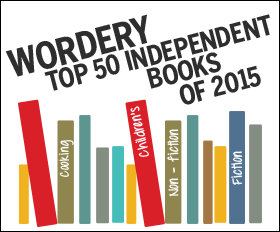
Also on the heels of Amazon is Wordery , an online bookshop handling print books only and offering free worldwide delivery (and currently better deals on both my books!).
Patsy Trench
patsytrench@gmail.com


December 21, 2015
Exercises in marketing 2
It’s true you can upload your book onto the Amazon site and to Smashwords for free, but if you want a professional job done you will have to pay for parts of it.

Barney the book salesman
At a rough estimate it costs at the very least £500 to self publish a book, to include editing and cover design and other odds and ends such as fliers or postcards, review copies etc. (The dog comes free, bribed by biscuits.) If you’re hiring help with creating your paperback and converting to ebook that will bump the costs up; and if you’re publishing through Ingram Spark there’s a small fee to upload your book, plus £144 for ISBNS (sold in a minimum of 10).
It’s also a good idea to set aside something for marketing. I had my first go at promoting The Unlikely Adventures of Claudia Faraday at the weekend using an online site called ebooksoda. You register, upload your book details, blurb and price, and choose a category – historical romance in my case – and in return for a fee of $15 (£10 or so) they promote your book to their subscribers by email on one specified day; though the book remains on their site, further down the page, for a few days afterwards. It’s good to offer a discount, so you need to make sure this is in place on the day of the promotion. Amazon changed the price almost immediately, Smashwords likewise except for Nook, which took around 24 hours. (NB The price on the amazon.com site was showing up as $3.03 in the UK, but $2.99 in the US, for some reason.)
Result? Zilch. No sales whatsoever.
However, when I emailed ebooksoda to tell them I had registered with them but not received any emails or made any sales they responded swiftly, pointed out a blip in my registration and refunded the fee, even though there had been some click-throughs apparently. So thank you ebooksoda.
As I said before however each author, each book, each day is quite different. My next promotion is with bargainbooksy later this month. Better luck this time hopefully.


December 18, 2015
Exercises in marketing
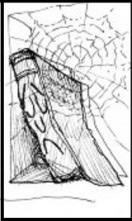
Sketch by Anna de Polnay
I have been self publishing since 2012 (only 3 books so far) but surprisingly maybe I’ve never before had to find a marketing stategy, perhaps because my first two books are non fiction.
I have however read everything there is to know about marketing, becoming an entrepreneur, building a platform, creating your brand and all those other ghastly business-oriented terms. I have also discovered some useful things, such as:
Marketing that works for one author doesn’t necessarily work for another.
Marketing that works for one kind of book doesn’t always work for another.
Non fiction is easier to market than fiction.
Above all it’s vital to find a strategy that you are comfortable with. If you are physically unable to accost people in the street or tell everyone you come upon from bus drivers to checkout people about your book (as am I), then don’t. Think of something else.
Try and make it fun.
To this end I am for the first time trying some online promotion sites for my 1920s novel The Unlikely Adventures of Claudia Faraday, beginning tomorrow, December 19. I’ll be blogging about my progress.
Patsy Trench
patsytrench@gmail.com


December 13, 2015
Sex and the older woman
Q: So – sex and the older woman, is that what Claudia Faraday is about?
A: Partly, yes.
Q: And is this her?
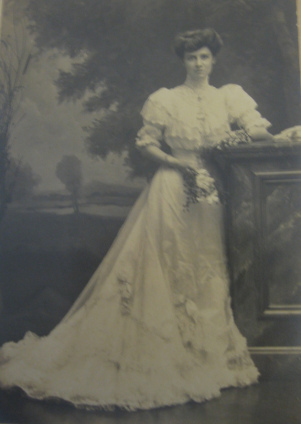
A: No, this is my great grandmother. She’s of an era, you could say.
Q: So the book is taken from Claudia’s diary, is that right? How did it come about?
A: Through Claudia’s great granddaughter, who I met through a mutual friend. She arrived on my doorstep one day with this diary she’d discovered in the attic of the family home she was clearing. It was her idea I look through it and see if I thought it might be publishable. Once I’d got the hang of the tiny writing and the weird and wonderful way Claudia skirted round the more intimately personal stuff I couldn’t put it down.
Q: Claudia Faraday is not her real name. Why did you change it?
A: On request, to protect her reputation.
Q: So the contents of the diary were pretty salacious.
A: Slightly scandalous, is how I’d put it. It’s about a middle-aged mother of three discovering the joys of sex for the first time, and how that changes her view of the world.
Q: Would you describe it as erotica?
A: If people are looking for erotica they will be disappointed. It isn’t Fifty Shades of Grey, it isn’t even Fifteen. But it is a bit naughty, yes.
This is a woman who was brought up in Victorian times – long skirts, corsets, tidy hair and impeccable behaviour – when sex was considered a duty rather than a pleasure, and only for married women, of course. There were plenty of women like Claudia, who never discovered that sex could be fun, and joyful, and fulfilling. Who’d never heard of the clitoris let alone known what it could do. Marie Stopes was just emerging onto the scene with her book Married Love where she made the shocking assertion that there was nothing wrong with indulging in sex for pleasure, not just for procreation. That is what is so intriguing about Claudia’s story.
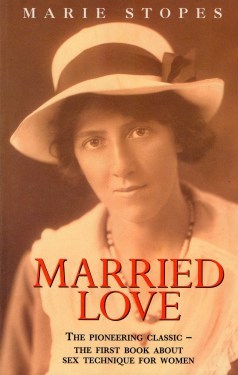
But what’s equally if not more fascinating is having experienced her first sexual orgasm and discovered, in a rather unlikely way, that sex was not just lying back and thinking of England, Claudia’s life takes on a whole new meaning. Not only does she see things more clearly – literally – but it jolts her out of the semi-torpor that her life has become now her daughters have left home and she’s on her own with a husband working overseas. So she discovers things about herself, and her friends, she was unaware of.
Q: So if Claudia’s husband is overseas that implies her sexual awakening is not at his hands, so to speak. Does that mean her marriage is over?
A: You’ll have to read the book to find out.
Q: You make references to Virginia Woolf’s Mrs Dalloway – why is that?
A: For fun. As I was reading the diary I kept thinking of Mrs Dalloway, who was of a similar age to Claudia. I had to do a certain amount of background research into the 1920s while I was writing the book, so I embedded references to some of the books and films of that period such as Mrs Dalloway and Lady Chatterley’s Lover, Evelyn Waugh’s Vile Bodies, etc. etc.
Q: What about Noel Coward? Did he appear in the diary?
A: No, I made that up.
Q: How much of it did you make up?
A: As I said a lot of Claudia’s writing was elliptical, she referred to events and people in a roundabout way which made me wonder whether, even if she wasn’t deliberately writing for publication, she was aware people mind find her diary and at least read it, if not publish it. For example, the ‘inciting episode’ that sets the whole thing off: the surprise visit by a stranger – I could show you what she actually wrote, and you’d be hard-pressed to really know what happened. It’s only as the rest of her story unravels that I was able to figure out what went on between the two of them.
Q: I’m curious to know more about Gabriel, the ‘messenger’. Is that why you called him Gabriel?
A: Absolutely. Because that is what he is. The stranger who arrives out of the blue, delivers his dynamic message and goes again, never to reappear. Just as Gabriel did with the Virgin Mary. A lofty comparison, I realise, but it fits. Except he doesn’t make Claudia pregnant. That would be a miracle too far.
Q: But who is he exactly? Is he really a colleague of her husband’s? In which case, did he send him? Or is he a kind of mythical figure?
A: That is a very good question: who exactly is Gabriel and why would he do to Claudia what he did? The best answer I can come up with is he’s whoever you think he is. He is the catalyst, the instigator, the one who turns Claudia’s life around without becoming a part of that life. The basic plot is a familiar one: the stranger who arrives out of the blue and changes people’s lives. He’s the Inspector in An Inspector Calls – did he really exist? Or did he emerge from the family’s conscience?
Q: How easy is it to write about over-age sex?
A: ‘Over-age sex’, I like that! It’s no different to writing about any-age sex. If a woman – and a man – still have a sex drive in their fifties, or older, then what’s wrong with writing about it? I’ve used a wee bit of irony, because it’s taken Claudia so long to discover the fun in it. The whole book is a light-hearted take on sex in the 1920s, you could say.
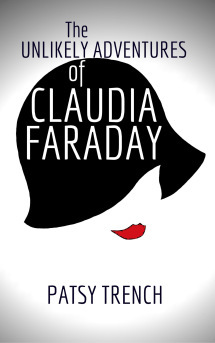
Available as ebook and paperback from
Amazon, Kobo, Nook, Barnes & Noble, Apple
and Booktopia (Aus)


November 27, 2015
NaNoWriMo 2
I am not one of them, though at around 33,000, which is maybe half a novel, I’m feeling relatively pleased with myself.

NaNoWriMo.org
Has it been worthwhile?
YES.
Partly for the reasons explained in my last blog, and partly because
there have been many times I’ve come to a complete halt and while I would normally have shoved what I’ve done into a bottom drawer (figurately) to get back to later (or not), on this occasion I have ploughed on.
there’ve been several times I’ve needed to research something – WW1, the Suffragists, spying in the 19th century – but rather than nipping out to spend several hours or days in a library I’ve done a quick flip through my history books (and yes, Google) and ploughed on. Research and adjustment can come later.
not allowing myself to go back on stuff means I’m not getting as sick of re-reading my own writing as I usually am.
Will the end result constitute a viable novel? Maybe, maybe not. Once it’s done, all 70,000 or so words of it, that’s the time for the bottom drawer.
CONGRATULATIONS to everyone who has kept at it throughout the month, whether or not you’ve achieved your 50,000 words. As the NaNoWriMo website keeps telling us: WE ARE AMAZING.



November 8, 2015
NaNoWriMo

NaNoWriMo.org
There’s a certain amount of pressure on indie authors these days to churn out several books a year. (Never mind the quality, feel the width.) If you believe some of the hype coming usually from the US there are self published writers out there earning zillions, because they’re writing a dozen books a year, in series, therefore building a ‘platform’ and a loyal readership.
There is sense in this, though for many of us the words ‘platform’ and ‘entrepreneur’ – another favourite – fill us with fear and trembing. Most indie authors don’t make much money, or expect to. We write because we want to write, because, perhaps, we are vain enough to think other people might be prepared to devote a few hours to reading what we have to say. No matter how shy you might be it is true to say you’ve got be quite arrogant to be a writer.
NaNoWriMo – National Novel Writing Month – began a few years ago, in the US of course. The idea is you register on the website and over the 30 days of November you churn out 50,000 words – which is not quite a novel but is quite an achievement. It works out at just under 2,000 words a day.
I’d known about NaNoWriMo for a while but thought it was nothing more than a gimmick with an ugly name. But this year, it being November and not a lot going on, I thought I’d give it a go. We’re only a week in but here’s what I’ve discovered so far:
If you are a fastidious writer who likes to waste time going over your first 20 pages until you’re blue in the face, this is for you.
If you are easily distracted, can’t wait to sharpen pencils or clean the windows or more likely glance quickly at Facebook, this is for you.
If you are full of doubt about your ability to write in the first place, or to build a plot or create characters, this is for you.
If you are inclined to spend a ridiculous amount of time researching, both before and during the writing process, because you really really have to get it right, this is for you.
I am all of these things. That’s partly why it took me six years to write my first book (The Worst Country in the World – though here was a lot of genuine research involved in this) and a couple of years to write my second (The Unlikely Adventures of Claudia Faraday, absolutely no excuses there). The novel I’m embarking on as part of NaNoWriMo features a character in my last book, as it happens, which makes it part of a series as it happens. But I have absolutely no idea how my story is going to proceed, I have no plan, every day I’m starting out with an empty screen and a blank mind.
Knowing you’re expected to produce all those words, every day of the week, is liberating. It liberates you from going over and over that difficult passage that quite likely will be jettisoned from the final draft of your book anyway. It frees you from having to research every item, moment in history or, in my case, actual person, and then finding it impossible not to include everything you’ve learned just to show off. It frees you from dithering – shall we switch to a passionate romance in the South of France in the next chapter or shall we stage a momentous marital row leading to divorce? – stalled by thinking the decision you make is crucial, and irrevocable.
Whether or not you, or I, end up with any kind of a product at the end of the month isn’t really the point. What is exciting about writing is discovery. You wake up in the morning without an idea in your head and a couple of hours later, there you are with a brand new character doing stuff you never dreamed you would dream up in a million years. It’s childish in some ways, in the best ways, playing with your imagination and seeing where it will take you. Writing through (is it through or with?) the seat of your pants as the expression goes may not suit every writer. But I would actually recommend it, even to the meticulous planners, if only as an experiment. You might surprise yourself. Which is ultimately what writing is all about.
NaNoWriMo.org


October 28, 2015
Rejection: anything but the truth
Many years ago my scriptwriting agent gave me the sack.
He called me into his office and sat me down and explained that since his colleague, who handled the younger and more inexperienced writers (of which I was one) was leaving to set up on his own, he didn’t think he could act as my agent any more. He and his remaining partner handled some top-name writers and spent most of their time negotiating million dollar deals, leaving them with little time to actively go out and seek work for their newer writers. I’m not saying I left his office on a high exactly, but it was handled so well, with such respect and honesty, that I did not feel in the least downhearted. He could so easily – as others have since – just sent me a note, or left a phone message (this being before the days of emails).
I’ve received many rejections since then and none of them were conducted so straightfowardly. I’ve had some strange reasons given too, as I’m sure many writers have. A couple I received lately left me a tad puzzled: a bookshop turned me down for a reading because my book had a prologue; and a cancer charity turned down my offer to write a book as a fundraiser because of building works. In the case of the latter I didn’t want to embarrass both of us by pointing out that whatever work it involved (a lot) was mine, not theirs, as they clearly didn’t like my proposal. Fair enough, but why not give me the real reason?
I have sympathy for people whose job it is to give bad news. Debt collectors, doctors, policemen, bailiffs, literary agents, publishers, the list is endless. (I’ve experienced bailiffs myself, twice. The first one looked sorrowful, and was exceedingly polite in a regretful kind of a way. The second smirked his way round my living room as he sized up the value of my furniture and I could have kicked him in the shins. Or elsewhere.) My point is: rejection is a part of everyone’s life, so why do people find it so difficult to tell the truth? Perhaps I’m guilty of it myself, if so unwittingly. It’s not a case of being soft, or even sympathetic, it’s a case of being honest.
“It’s isn’t me, it’s you, actually.”
I’d be fascinated to hear stories of other people’s rejections, and the reasons for them – the weirder the better.
patsytrench@gmail.com








